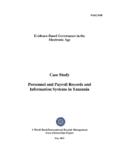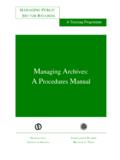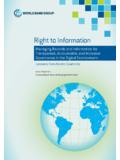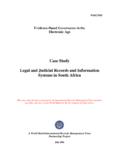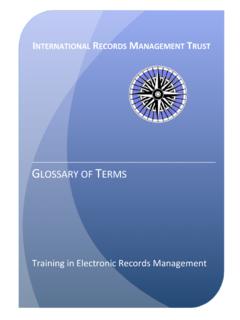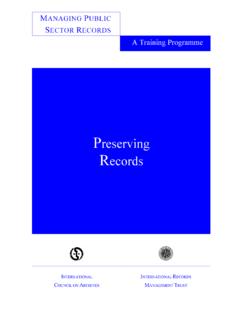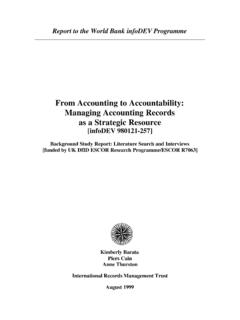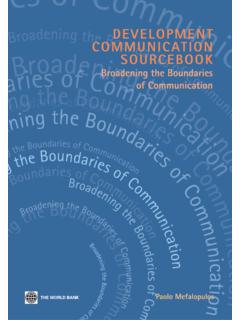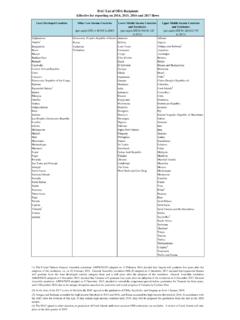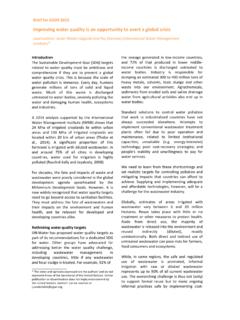Transcription of A Training Programme - The International Records ...
1 MANAGING PUBLIC SECTOR Records A Training Programme Understanding Computers: An Overview for Records and Archives Staff International COUNCIL ON ARCHIVES International Records MANAGEMENT TRUST MANAGING PUBLIC SECTOR Records : A STUDY Programme UNDERSTANDING COMPUTERS: AN OVERVIEW FOR Records AND ARCHIVES STAFF MANAGING PUBLIC SECTOR Records A STUDY Programme General Editor, Michael Roper; Managing Editor, Laura Millar UNDERSTANDING COMPUTERS: AN OVERVIEW FOR Records AND ARCHIVES STAFF International Records International MANAGEMENT TRUST COUNCIL ON ARCHIVES MANAGING PUBLIC SECTOR Records : A STUDY Programme Understanding Computers: An Overview for Records and Archives Staff International Records Management Trust, 1999. Reproduction in whole or in part, without the express written permission of the International Records Management Trust, is strictly prohibited. Produced by the International Records Management Trust 12 John Street London WC1N 2EB UK Printed in the United Kingdom.
2 Inquiries concerning reproduction or rights and requests for additional Training materials should be addressed to International Records Management Trust 12 John Street London WC1N 2EB UK Tel: +44 (0) 20 7831 4101 Fax: +44 (0) 20 7831 7404 E-mail: Website: Version 1/1999 MPSR Project Personnel Project Director Anne Thurston has been working to define International solutions for the management of public sector Records for nearly three decades. Between 1970 and 1980 she lived in Kenya, initially conducting research and then as an employee of the Kenya National Archives. She joined the staff of the School of Library, Archive and Information Studies at University College London in 1980, where she developed the MA course in Records and Archives Management ( International ) and a post-graduate research Programme . Between 1984 and 1988 she undertook an onsite survey of record-keeping systems in the Commonwealth.
3 This study led to the foundation of the International Records Management Trust to support the development of Records management through technical and capacity-building projects and through research and education projects. General Editor Michael Roper has had a wide range of experience in the management of Records and archives. He served for thirty-three years in the Public Record Office of the United Kingdom, from which he retired as Keeper of Public Records in 1992. He has also taught on the archives courses at University College London and the University of British Columbia, Canada. From 1988 to 1992 he was Secretary General of the International Council on Archives and since 1996 he has been Honorary Secretary of the Association of Commonwealth Archivists and Records Managers (ACARM). He has undertaken consultancy missions and participated in the delivery of Training programmes in many countries and has written extensively on all aspects of Records and archives management.
4 Managing Editor Laura Millar has worked extensively not only as a Records and archives management consultant but also in publishing and distance education, as an editor, production manager and instructional designer. She received her MAS degree in archival studies from the University of British Columbia, Canada, in 1984 and her PhD in archival studies from the University of London in 1996. She has developed and taught archival education courses both in Canada and internationally, including at the University of British Columbia, Simon Fraser University and the University of Alberta. She is the author of a number of books and articles on various aspects of archival management, including A Manual for Small Archives (1988), Archival Gold: Managing and Preserving Publishers Records (1989) and A Handbook for Records Management and College Archives in British Columbia (1989).
5 Project Steering Group Additional members of the Project Steering Group include Association of Records Managers and Administrators (ARMA International ): Hella Jean Bartolo International Council on Archives: George MacKenzie Project Management Consultant: Tony Williams University College London: Elizabeth Shepherd Video Production Co-ordinator: Janet Rogers Educational Advisers Moi University: Justus Wamukoya Universiti Teknologi Mara: Rusnah Johare University of Botswana: Nathan Mnjama University of Ghana: Harry Akussah, Pino Akotia University of New South Wales: Ann Pederson University of West Indies: Victoria Lemieux Project Managers Lynn Coleman (1994-6) Laura Millar (1996-7) Elizabeth Box (1997-8) Dawn Routledge (1999) Production Team Additional members of the production team include Jane Cowan Nicki Hall Greg Holoboff Barbara Lange Jennifer Leijten Leanne Nash Donors The International Records Management Trust would like to acknowledge the support and assistance of the following.
6 Association of Records Managers and Administrators (ARMA International ) British Council British High Commission Ghana British High Commission Kenya Caribbean Centre for Development Administration (CARICAD) Canadian International Development Agency (CIDA) Commonwealth Secretariat Department for International Development (East Africa) Department for International Development (UK) DHL International (UK) Limited Foreign and Commonwealth Office Human Rights Fund Hays Information Management International Council on Archives Nuffield Foundation Organisation of American States Royal Bank of Scotland United Nations Development Program Understanding Computers: An Overview for Records and Archives Staff Principal Author KIMBERLY BARATA Kimberly Barata is a Research Officer and Consultant for the International Records Management Trust. She is a specialist in electronic Records and has advised the Governments of Ghana, Malta and the Secretariat for the Commission for East African Co-operation.
7 Prior to her appointment with the Trust, she was the UK Representative for Archives and Museum Informatics (A&MI) and a senior research fellow at the School of Library, Archive and Information Studies at University College London. Kimberly is a graduate of the University of Pittsburgh School of Information Sciences and participated in the latter end of the Functional Requirements for Recordkeeping Project. Contributors Elizabeth Box John McDonald Laura Millar Reviewers Terry Cook, (formerly) National Archives of Canada Tony Leviston, State Records Authority of New South Wales Testers Kenya National Archives and Documentation Service State Archives and Heraldic Services, South Africa CONTENTS Introduction 1 Lesson 1 An Introduction to Computer Technology 4 Lesson 2 Computing Environments 27 Lesson 3 Computer Applications 41 Lesson 4 What to Do Next?
8 55 FIGURES 1. Sample Home Page 35 2. Relational Tables 45 3. Examples of Data Records 46 4. Sample Electronic Mail Message 50 UNDERSTANDING COMPUTERS 1 INTRODUCTION INTRODUCTION TO UNDERSTANDING COMPUTERS: AN OVERVIEW FOR Records AND ARCHIVES STAFF This introductory module is designed as support for other MPSR modules in the series that refer to the use of computers to varying degrees. It aims to familiarise those who may be unacquainted with some of these basic computer concepts.
9 As well as describing the concepts associated with computer technology, this module explains some of the key terms students will encounter as they establish relationships with specialists in the information technology community. Understanding Computers: An Overview for Records and Archives Staff should be read before the other computer-related modules in this Programme , Automating Records Services and Managing Electronic Records , as much of the basic information important to those modules is introduced here and so is not explained in those modules. This module includes the following lessons: Lesson 1: An Introduction to Computer Technology Lesson 2: Computing Environments Lesson 3: Computer Applications Lesson 4: What to Do Next?. AIMS AND OUTCOMES Aims This module has six primary aims. These are to 1. introduce the key components of a computer system (hardware, software, data) 2. acquaint readers with how computers work UNDERSTANDING COMPUTERS 2 3.
10 Present the basic concepts of various computing environments 4. give a broad view of how technology is improving communications through the use of electronic mail and the Internet. 5. discuss the various kinds of storage media and recording formats and methods commonly associated with a computer 6. explain how to obtain more information on computerisation. Outcomes At the end of this module, you should understand 1. the key components of a computer system (hardware, software, data) 2. the basics of how computers work 3. the basic concepts of various computing environments 4. how technology is improving communications 5. the various kinds of storage media and recording formats and methods available 6. where to go for more information on computerisation. METHOD OF STUDY AND ASSESSMENT This module of four lessons should occupy about 45 hours of your time. You should plan to spend about: 15 hours on Lesson 1 12 hours on Lesson 2 10 hours on Lesson 3 8 hours on Lesson 4.
